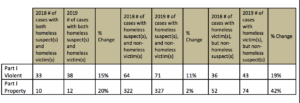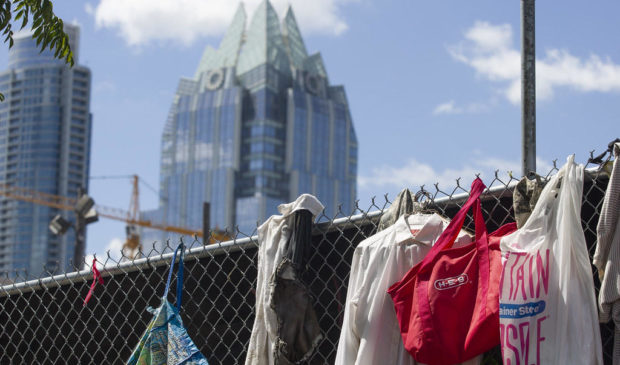Austin reinstates limited bans on camping and resting in public
Friday, October 18, 2019 by
Andrew Weber, KUT The Austin City Council reinstated partial bans on camping, sitting and lying down in public on Thursday. After hours of debate, Council approved the new ordinance on a 7-4 vote.
The city’s new rules ban camping, sitting and lying down within 15 feet of a doorway to a home or an open business and within the area of a city-operated emergency shelter, including the immediate vicinity of the Austin Resource Center for the Homeless and within half a mile of any future city shelter. The ordinance also bans camping on sidewalks.
The vote comes after months of scrutiny and outright divisiveness after Council voted to roll back its previous ordinances in June. That divisiveness was on display at City Hall on Thursday as well, with the discussion ultimately being riven by competing views over how the city should regulate behavior related to homelessness. One bloc included Council members Kathie Tovo, Alison Alter, Leslie Pool and Ann Kitchen, who crafted a draft ordinance. Mayor Steve Adler, along with Council members Pio Renteria, Greg Casar, Natasha Harper-Madison, Paige Ellis, Jimmy Flannigan and Mayor Pro Tem Delia Garza, banded together to craft another vision.
The Adler-sponsored proposal, which provides less prescriptive bans on camping and resting in public, ultimately passed after hours of debate and public testimony.
The Kitchen proposal would have banned camping on sidewalks, in and along creek beds and in areas considered to be at high risk of wildfires. Those provisions were offered as amendments to the Adler proposal, but were ultimately swatted down over the course of the debate, which lasted roughly seven hours. The ordinance that passed does include the prohibition of camping on sidewalks and in areas at risk of wildfire.
The votes were largely along those lines, though they were nearly derailed by a last-minute threat of abstention by Council Member Harper-Madison shortly before the final vote on the ordinance. Harper-Madison tried to strike down the ban near city shelters, arguing that it was “the absolute epitome of sweeping homelessness under the rug.”
Adler said he admired the sentiment of Harper-Madison’s amendment, that it was “pure in its simplicity,” but ultimately voted against the amendment because it was “going to be what it takes” to help people experiencing homelessness.
Harper-Madison said she didn’t have any pretense that any of the issues and discussion surrounding them were simple, but that it could possibly lead to a re-criminalization of homeless Austinites.
“In my heart, I still don’t feel like we have to either help people or criminalize them,” she said.
She ultimately voted in favor of the ordinance.
Much of the discussion over both proposals centered around how specific Council should be in outlawing certain behaviors versus how much deference should be given to city staff and the Austin Police Department in enforcing the rules and identifying potentially unsafe areas for camping.
Austin Police Chief Brian Manley addressed Council intermittently on issues surrounding enforcement and admitted that there was still leeway within the final ordinance that allowed for interpretation on the part of police officers.
Asked point-blank by Council members Alter and Kitchen, Manley said he would prefer the old, pre-July ordinances over the ones that were in effect for the last three months, adding that he would prefer Council pass a ban on camping, sitting and lying down on all sidewalks to alleviate the need for on-the-ground interpretation by officers.

A comparison of 2018 and 2019 violent crime and property crime in the downtown area involving homeless people between July and September, credit City of Austin.
He also addressed the assertion that Austin’s previous ordinances caused a public safety crisis in the three and a half months since they went into effect. Manley said compared to 2018, violent and property crimes involving a victim or suspect that happened to be homeless had gone up, according to APD data. Still, it wasn’t on the scale that has been suggested by opponents of the ordinances.
Kitchen, Tovo, Pool and Alter tried in vain to roll in prescriptive bans on camping along and in creeks, on some traffic medians near high-traffic roads, on wheelchair ramps and in culverts.
Kitchen also tried to widen the scope of the ban near shelters outside the downtown area. The District 5 Council member spearheaded the city’s efforts to build a new $8.6 million shelter near Banister Lane and Ben White Boulevard. Her amendment was, she said, in direct response to complaints from neighbors in the Galindo area who think the shelter is too close to schools.
Council Member Alter successfully amended the ordinance to ban camping in areas that are at risk of wildfire – which is roughly 14 percent of Austin. Council Member Flannigan suggested it would be redundant, as the ban already includes parks, preserves and neighborhoods, but the amendment passed.
Adler and others argued that much of the delineation of unsafe areas for camping could be decided by the city’s transportation and public health officials, as well as the Austin Police Department, which just rolled out new guidelines for enforcing camping and obstruction rules that could include identifying unsafe roadways and outdoor areas.
The vote comes ahead of a Nov. 1 deadline imposed by Gov. Greg Abbott, who threatened state intervention over Austin’s homelessness policies, citing public health and safety hazards he pinned on homeless encampments and what he described as rampant public drug use and defecation.
It’s not clear whether Council’s actions will be enough to satisfy the governor, who demanded the city reinstate the previous ban on camping and resting.
Just before the vote, Alter said despite their differences over the ordinances, Council members will still have to face what, if any, state intervention awaits them at the end of the month.
“We will stand firm together in what may not be a pretty scene come November, if the governor acts as promised,” she said.
The ordinance passed Thursday will go into effect Oct. 27.
This story has been updated. This story was produced as part of the Austin Monitor’s reporting partnership with KUT. Photo by Julia Reihs.
The Austin Monitor’s work is made possible by donations from the community. Though our reporting covers donors from time to time, we are careful to keep business and editorial efforts separate while maintaining transparency. A complete list of donors is available here, and our code of ethics is explained here.
You're a community leader
And we’re honored you look to us for serious, in-depth news. You know a strong community needs local and dedicated watchdog reporting. We’re here for you and that won’t change. Now will you take the powerful next step and support our nonprofit news organization?








